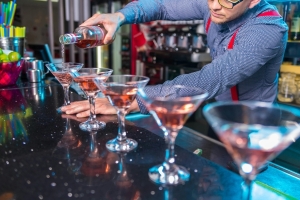Guidelines for the safety of bartenders and other professionals who work with alcoholic beverages
Junho 27, 2024Guidelines for the safety of bartenders and other professionals who work with alcoholic beverages
Professions that involve frequent interaction with alcoholic beverages face unique challenges related to alcohol consumption. For these professionals, alcohol is constantly present in the work environment, which can increase the risk of harmful use.
Daily familiarity with alcohol in the routine of some professions can lead to a distorted perception of what constitutes safe and moderate consumption, increasing the risk of developing harmful drinking habits. This may be the case for bartenders, waiters, sommeliers, and other professionals for whom alcohol is part of their work routine. This constant exposure can make it difficult for individuals to recognize and admit possible alcohol-related problems, given the normalization of its consumption in the context of their work.
A study published in 2022, analyzing more than 300 bartenders, revealed that 39% of participants exhibit harmful alcohol consumption and 43.6% report moderate to severe use, which may indicate alcohol dependence. The research shows that, in the case of these professionals, working more than 40 hours a week contributes significantly to the increase in alcohol consumption, with men and individuals between 26 and 40 years old showing greater problematic use when compared to other age groups.
There are no official safety guidelines for alcohol consumption among these professionals in Brazil. However, we can list some protection measures that can be effective for these professionals:
- Moderation: If you must consume alcohol, especially during work hours, do so in moderation. This means not exceeding one drink, in the case of women, and two, in the case of men. This helps maintain professionalism and ensures they can perform their duties properly.
- Hydration: Drinking plenty of water between alcoholic beverages can help prevent dehydration and mitigate the effects of alcohol consumption.
- Pause: It is important for bartenders and sommeliers to drink slowly and take breaks when tasting alcoholic beverages. This can help avoid excessive consumption and the associated risks.
- Avoid drinking on an empty stomach: Consuming alcohol on an empty stomach can lead to faster intoxication. Eating a balanced meal before or during alcohol consumption can help slow the absorption of alcohol into the bloodstream.
- Know your limits: Understanding your own alcohol tolerance is crucial. Bartenders and sommeliers must know when to stop drinking and avoid peer pressure to overconsume.
- Designated driver or alternative transportation: Planning ahead for safe
- transportation after work events where alcohol is consumed is important. Having a designated driver who will not consume alcohol or use alternative transportation options can prevent accidents and ensure everyone gets home safely.
- Training and education: Many establishments offer training and education on service and responsible alcohol consumption for their employees, including bartenders and sommeliers. This includes information about recognizing signs of intoxication in clients and themselves and taking steps to prevent and avoid them.
- Workplace policies: Some establishments have specific policies regarding employee alcohol consumption, both during and outside of work hours. It is important that bartenders and sommeliers are aware of and follow these policies.
It is also important that public policies and interventions in the workplace are adapted to meet the needs of these workers, offering clear guidelines for consumption and assistance programs for professionals in need. Awareness and prevention programs should focus on education about drinking limits and strategies for dealing with workplace pressure to consume alcohol.
References:
Bell, Deborah, and Florentia Hadjiefthyvoulou. “Alcohol and drug use among bartenders: An at risk population?.” Journal of substance abuse treatment vol. 139 (2022): 108762. doi:10.1016/j.jsat.2022.108762.


